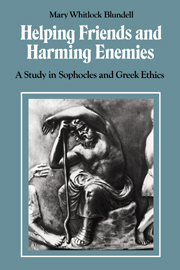In the opening lines of Philoctetes, Odysseus addresses his companion Neoptolemus as his famous father's son (3f.). This is the first indication of an important theme: phusis, in the sense of inherited human qualities or capacities. Although Achilles has died before the dramatic action begins, he hovers in the background of the play, and no one challenges his claim to the highest admiration. Neoptolemus is closely associated with his father, and is repeatedly addressed or referred to as his father's son. In one particularly striking passage of his deception speech he describes to Philoctetes his own reception at Troy, where the welcoming army swore that they saw the dead Achilles alive once more (356–8). These lines conjure up a vivid physical likeness between father and son, but it remains to be seen how deep the resemblance really lies. Neoptolemus has the potential, in virtue of his inherited phusis, to be as admirable as Achilles.3 But two questions remain to be answered in the course of the play: Will he prove to be his father's son in character as well as birth? If so, how will this excellence be manifested?
